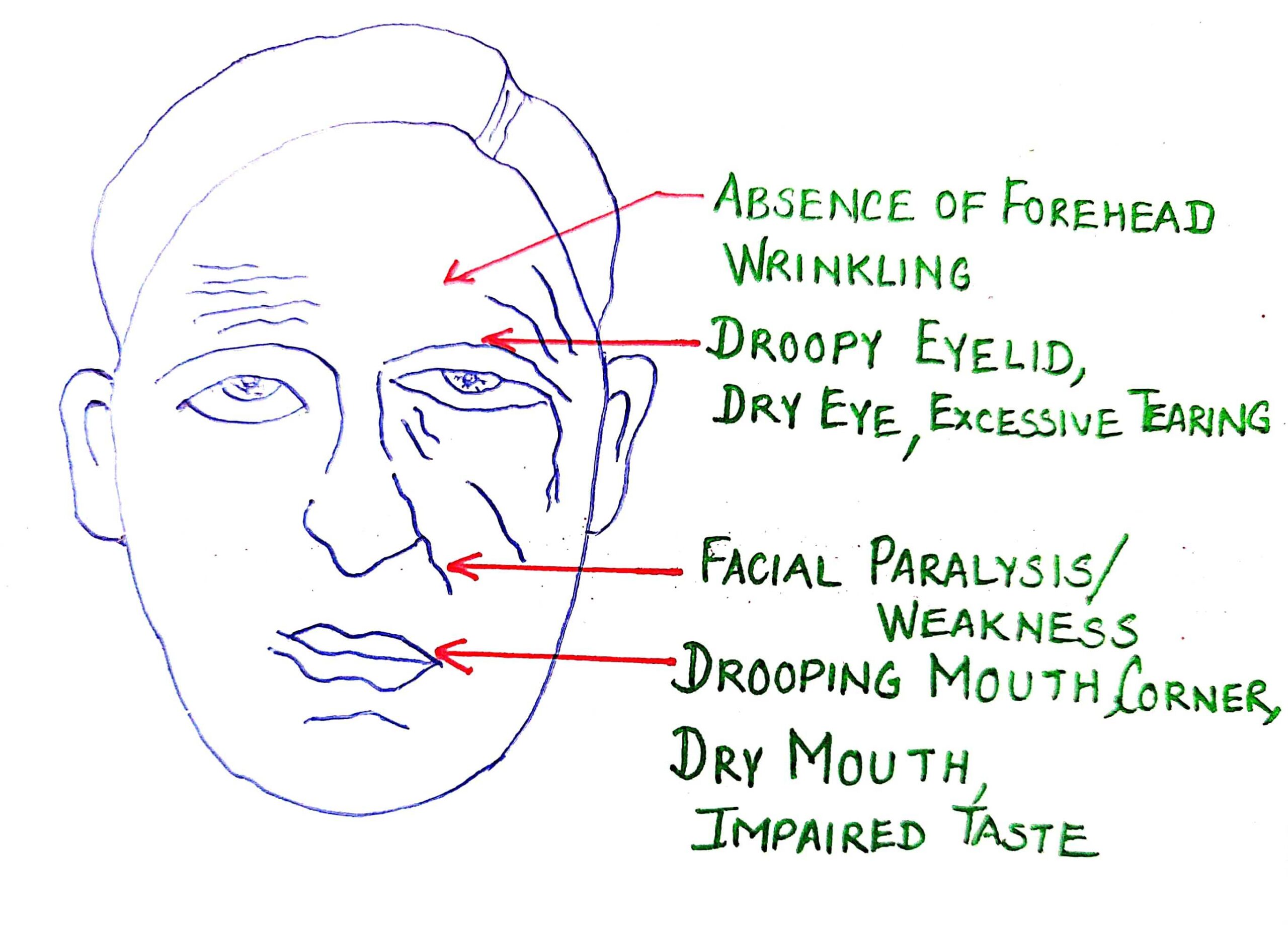Bell’s palsy is an idiopathic disorder, which means what are causes of bell’s palsy are not yet fully understood. A non-progressive neurological condition of the facial nerve is called Bell’s palsy (seventh cranial nerve). The most common acute condition affecting only one nerve is facial nerve palsy, with Bell’s palsy seeming to be the most prevalent cause of acute facial paralysis.
It has not yet been identified what are causes of Bell’s palsy are; nevertheless, facial nerve compression or swelling (due to viral infection) may be the reason. Bell palsy is characterized by sudden weakening or paralysis of muscles on one side of the face caused by a dysfunction of the seventh cranial nerve (facial nerve). This nerve activates the salivary and tear glands, causes the front two-thirds of the tongue to register flavours, moves the facial muscles and also regulates a muscle related to hearing. However, in Bell’s palsy, the entire half of the face is paralysed, including the forehead, but in a stroke, the forehead is typically spared. (1)
Bell’s palsy can also cause the following symptoms, which a person may experience:
- Hyperacusis (hearing noises that are abnormally loud on the affected side) occurs when the middle ear muscles that stretch the eardrum become paralysed.
- Having trouble closing the affected side’s eye, lip, or both.
- Eye blinking is impaired, resulting in dry eyes, discomfort, and irritation.
- Saliva and tear production is impaired.
- Mouth drooping on one side,
- Drooling from the affected side,
- Drooping eyebrow, a flat or expressionless face,
- Taste perception is impaired due to the inability to taste with the front section of the tongue on the affected side,
- Strange sensations in the face,
- facial pain.
Within a few weeks, symptoms normally begin to subside, and full recovery usually takes six months.
What are causes of Bell’s Palsy
Bell’s palsy is caused by a reduction in blood flow (ischemia) and/or compression of the 7th cranial nerve. A lack of blood flow and pressure on the 7th cranial nerve as a result of nerve swelling causes symptoms to appear. The facial nerve, or the seventh cranial nerve, connects the brainstem to the face and tongue. Facial nerves, one on each side of the face, help regulate facial expressions such as smiling and frowning, play a part in some jaw movements, control some muscles influencing the middle ear, and activate glands that generate tears and saliva. Inflammation can induce nerve compression when it goes through the facial canal, which is located near the temple where the nerve passes through the bony skull. This compression can have an impact on the impulses that pass from the brain to the facial muscles. As a result, the facial muscles weaken or paralyse, as seen in Bell’s palsy. Although the exact cause of facial nerve compression is still unknown, correlations to viruses (such as herpes, influenza, and respiratory tract infections), a weakened immune system, and stress have been established. Lyme illness (bacterial infection produced by infected ticks), HIV (damages the immune system), trauma, sarcoidosis (causes organ inflammation), TB, vasculitis, and tumour are all associated with facial nerve palsy. (2)
High-risk factors for Bell’s palsy include diabetes, high blood pressure, obesity, pregnancy, being over 40, and preeclampsia (high blood pressure during pregnancy).
Treatment
Within 72 hours after the onset, if you think you may have Bell’s palsy, you should see your doctor for advice since, according to research, this is when Bell’s palsy will react to treatment the best. Exercises appropriate for each stage of bell’s palsy recovery will be suggested by a physiotherapist. It will be possible to recover from facial palsy with the aid of rehabilitation techniques including facial massage, facial muscle exercises, and stimulation.
Must Read >>
- What is the Health Benefits of Ginger.
- What are Generic Medicine: Myths and Facts.
- Exercise During Pregnancy: Do’s and Don’ts
- Breast Cancer Awareness: Its Importance and Benefits
- What are the benefits of coconut water
- Weight loss exercise from home
- Exercises for frozen shoulder at home
- Why is water important to us
- How to stop hair fall in men
- What are symptoms for COPD
- Rich Fiber Diet
- What are the symptoms of asthma
- Aceclofenac paracetamol tablet uses
- What are the reasons of neck pain.
- What are the causes of breast cancer
- Exercise of Neck Pain
- Exercise for relieving back pain
- Self-Medication
- Home Remedy of Dry Cough
- What are causes of acidity
- Symptoms for Migraine Headaches
- What Causes Migraine in Females
